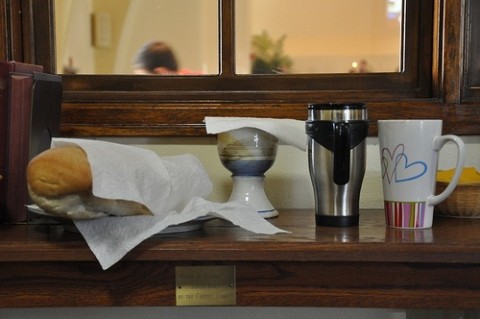Experiencing Eucharist

I grew up attending Bible and Baptist
churches; now I generally identify with the emerging church. So I've had quite
a learning curve at the Episcopal seminary where I'm studying. Between
balancing prayer books and hymnals and crash courses in chanting, I've frequently
felt like a stranger in a strange land.
I am open to learning this new rhythm of
worship, however foreign it feels at times. But I am discovering that I
struggle with the observance of the Eucharist. My issue isn't theology but
method: as I pray the same words each time I partake, I feel constrained and
long for something more. I'm not bored or looking to be entertained, I just
feel the need for our remembrance of Christ's sacrifice to reflect the infinite
diversity of the body of Christ.
I didn't grow up with diversity in
eucharistic practice. On the first Sunday of the month we were instructed to
search our hearts, confess our sins and then grab an oyster cracker and a plastic
shot glass full of juice (always juice). Only in the last few years has the act
of taking the bread and cup moved me to accept the call to live eucharistically
in the world. This happened only when I saw the Eucharist set free from its
traditional rituals.
In the house church I helped lead for a
time, we closed with the Eucharist every week. In that small setting, the way
we transitioned into sharing the bread and juice (yes, still juice) depended on
the day's lesson. If we had explored the stories of Jesus' healings, our
breaking of the bread would point us to how we could share our resources to
help heal the body of Christ. In weeks where we talked about community, we
would sit at a table and together mix the dough to bake our own bread.
We were the body of Christ, and the act
of Eucharist became the vehicle through which we understood our role in that
body. Breaking the bread and sharing the cup changed week to week--it assumed
the role of shaping us into who we were called to be.
The church I attend now similarly
re-imagines what it means to take and eat in remembrance of Jesus. In
discussing Jesus' encounter with the disciples on the beach before the
ascension, we partook of a communion of fish tacos--pushing us to reflect on
the disciples' experience. In a recent new leaders' meeting, we were charged to
humbly accept our call to serve the church through an invitation to partake in
a humble communion of pretzel snack packs and juice boxes.
A recent worship gathering focused on us
all being members of the body who have something to give. We were invited to an
empty table. There the story of Jesus feeding the 5,000 was told, with the
interpretation that the miracle was that after seeing the boy's gift of bread
and fish, the people shared what they had brought until they all had resources
in abundance. So we were asked to share whatever we had with us--gum, granola
bars, soft drinks, Goldfish, Altoids. The table overflowed with abundance,
which we served to each other.
Eucharist pulls me into these moments of
remembering what it means to be a disciple. It is ever evolving as it speaks to
a church that is always advancing the kingdom of God. I know the stories I've
told here may be offensive to some, and I respect the traditions that find
meaning in engaging Eucharist in one set way. But I've seen a world of meaning
open up when the Eucharist is allowed to be as dynamic and diverse as our
creative and infinite God--the God I respond to in remembrance when I take and
eat.





